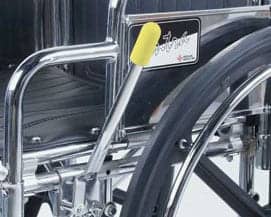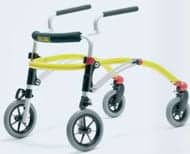 |
Competitive bidding is here. Now what? Fasten your seat belt (not to be confused with pelvic positioners) and hone your abilities to write very specific letters of medical necessity. Every parameter must be addressed so it can be included or excluded from the category of bidding.
This new process will apply only to the top 10 durable medical equipment (DME), prosthetics, orthotics, and supplies product categories. The idea is to start small and make the biggest impact on savings. Suppliers should be extremely careful not to underestimate their cost of doing business when bidding.
Products to be included in competitive bidding (specific products for 2008 are listed in the rule) are power wheelchairs, scooters, and related accessories; also negative-pressure wound therapy pumps and related supplies, as well as walkers and related accessories. In Texas, where Medicaid says it will follow Medicare, gait trainers may also be included on this list.
ARE THERAPISTS AFFECTED?
The rule includes provisions to allow certain medical professionals—such as physicians, physician assistants, OTs, and PTs—to provide DME on the competitive bidding list to patients without participating in the bidding process.
PTs in private practice do not have to competitively bid for off-the-shelf orthotics, but only must provide the orthotics as part of the professional service. Custom orthotics do not qualify for the competitive bidding program.
Responding to recommendations from APTA and other organizations, the agency granted an exception to the competitive bidding process for off-the-shelf orthotics that are routinely furnished as an integral part of physical therapy or occupational therapy services. Custom fabricated orthotics do not have to be competitively bid under the program. Practitioners who want to furnish a competitively bid item not specifically exempted by the final rule must submit a bid and be awarded a contract to do so. Bidding by accredited suppliers is expected to begin later this month, with winners announced in early December and payments derived from the bidding process going into effect in April 2008.
HOW WILL MANUFACTURERS REACT?
“We expect to continue our business at the same levels. We anticipate that some dealers will be more successful in the bidding process, so we will see a shift in who we sell to, but no change in actual number of units sold.” says Steve Scribner, vice president of a Matthews, NC-based supplier of pediatric rehabilitation equipment.
Manufactures are not directly involved in the bidding process. They have been bombarded with calls from suppliers in the areas affected pleading for lowered costs. (Although there will always be the potential that some manufacturers will specialize in making low-cost items meant to compete in categories with similar products.)
There have been rumors in the industry that some of these items are of lower quality and do not hold up. If that is true, then they will cost too much to service, and in the end the bids will be the same for the high-cost (little service) and low-cost (high service) equipment.
Bidding will quickly show that if a device is not durable and requires frequent service calls, it will not be popular with suppliers. If that power scooter that looks just like the big seller really is just as good, then this will put enormous pressure on the large manufacturers to shift factories to offshore locations, as well as to cut education and service. (I am going to remain optimistic, counting on CMS to respond appropriately and work out the kinks in this program.)
WHERE WILL IT HAPPEN FIRST?
Initially, the competitive bidding program will be launched in 2007 in the following 10 metropolitan statistical areas (MSAs):
- Charlotte-Gastonia-Concord, NC and SC;
- Cincinnati-Middletown, Ohio-Ky-Ind;
- Cleveland-Elyria-Mentor, Ohio;
- Dallas-Fort Worth-Arlington, Tex;
- Kansas City, Mo-Kan;
- Miami-Fort Lauderdale-Miami Beach, Fla;
- Orlando, Fla;
- Pittsburgh;
- Riverside-San Bernardino-Ontario, Calif; and
- San Juan-Caguas-Guaynabo, Puerto Rico.
The program will be expanded into 70 additional MSAs in 2009, and into additional areas after 2009.
Areas that may be exempt from DMEPOS competitive bidding include rural areas and areas with low population density within urban areas that are not competitive, unless there is a significant national market through mail order for a particular item or service.
AFFECTED PRODUCT CATEGORIES
At the outset, the competitive bidding program will include 10 of the top DMEPOS product categories that were selected based on criteria outlined in the final rule. With the exception of the product category for support surfaces, which is being phased in at two locations as part of the first round of competitive bidding, the following are the product categories for round one for the 10 MSAs:
- Oxygen supplies and equipment;
- Standard power wheelchairs, scooters, and related accessories;
- Complex rehabilitative power wheelchairs and related accessories;
- Mail-order diabetic supplies;
- Enteral nutrients, equipment, and supplies;
- Continuous positive airway pressure or CPAP devices, respiratory assist devices, and related supplies and accessories;
- Hospital beds and related accessories;
- Negative-pressure wound therapy pumps and related supplies and accessories;
- Walkers and related accessories; and
- Miami and San Juan only—Support surfaces (groups 2 and 3 mattresses and overlays).
WHAT WILL COMPETITIVE BIDDING DO TO THE STATE OF THE INDUSTRY?
Suppliers of complex rehabilitation have been extremely challenged over the past 4 years with coding, coverage, and payment changes. Moreover, while the National Coalition for Assistive and Rehab Technology (NCART) made recommendations regarding supplier standards for rehab companies, the reality of the new supplier standards for rehab will mean that suppliers’ costs to provide this complex technology will increase.
An NCART-commissioned study completed by The Moran Co just prior to implementation of the new power mobility HCPCS codes revealed that of the 27 observations reported, only three providers realized net operating income higher than 5% of revenues. The median observed net was 1.6%. Five of the 27 companies reported negative operating income in the most recent period. Given the thin margins earned by the vast majority of these providers, the Medicare product line will become unprofitable for many or most current providers. The only way that suppliers can bid below the current fee-schedule amounts for items included in the complex rehab category will be to seek lower-cost products or reduce their services. Both result in a negative outcome for individuals with disabilities.
Rehabilitation professionals are extremely concerned that the awarded price will also be used by other third-party payors and Medicaid that often pay a discount off the Medicare fee schedule. Should private payors mimic the Medicare competitive bidding price in some fashion, access to appropriate technology and the needed services will be further jeopardized for the non-Medicare population.
RECEIVING APPROPRIATE EQUIPMENT
How will clients ever be able to receive the appropriate equipment with these limitations?
NCART believes that many individuals with disabilities will not receive appropriate technology. The current HCPCS code set for complex rehabilitation equipment, coupled with CMS’ decisions regarding how they will handle coding changes outlined in the final rule, will absolutely prevent certain complex pieces of equipment from being made available to Medicare patients. For many of these items, the fee-schedule amount is already below supplier costs. The rule prevents any adjustment in pricing for the duration of a contract, even when it is clear the items will not be available. This, according to NCART, is unconscionable in its treatment of individuals with moderate to severe physical disabilities.
RESPONSE TO THE SITUATION
How are rehabilitation professionals responding to the challenge of competitive bidding? APTA has been active in this process and has worked extremely hard to get an exemption for orthotics (as previously mentioned above). Also, NCART scheduled a “Congressional fly-in” in Washington, DC, providing an opportunity for invited suppliers, manufacturers, clinicians, and consumers to educate Congress on the impact of CMS’ decision to bid complex rehab in the first round of national competitive bidding.
CMS has communicated to Medicare beneficiaries that it will realize savings relative to the copays that competitive bidding will offer. NCART wants to make sure that consumers and Congress are even more aware of the lack of access that will result from bidding complex rehab products.
SANER LEGISLATION?
Will patient and professional advocacy groups go to Capitol Hill and fight for reasonable legislation? According to Sharon L. Hildebrandt, executive director for NCART, the organization has been working to educate clinician and consumer groups about the true implications on their continuing ability to receive technologically advanced complex rehab products when these products are bid. NCART has also been working with congressional representatives and has gained support for an exemption for complex rehab.
Rhea Cohen, associate director of reimbursement for the APTA, says the organization strongly urged CMS to consider changes to the proposed rule, and many of the final provisions represent their consideration of rehabilitation professionals’ concerns.
HOW DO WE GET WHAT WE NEED FOR THE CLIENTS?
While there is still an ocean of unknowns, the most important piece will be the bid. Therapists must write perfect letters of medical justification, and suppliers must match the bid with the need. Meanwhile, during this period of readjustment, patience and lots of chocolate and martinis (and maybe even chocolate martinis) are recommended while riding this wave (or tsunami, if you will), waiting for CMS to respond and fix the critical issues that arise. No matter what happens, people will still need these devices, and they will need to be supplied, so hold on to your hats—and vent and share on the professional listserve of your choice.
Ginny Paleg, MS, PT, a pediatric physical therapist with the Montgomery County Infants and Toddlers Program in Rockville, Md, is a reimbursement representative for the pediatric section of the APTA, and teaches continuing education courses for several DME manufacturers. Paleg also is a member of Rehab Management’s editorial advisory board. She can be reached at .





